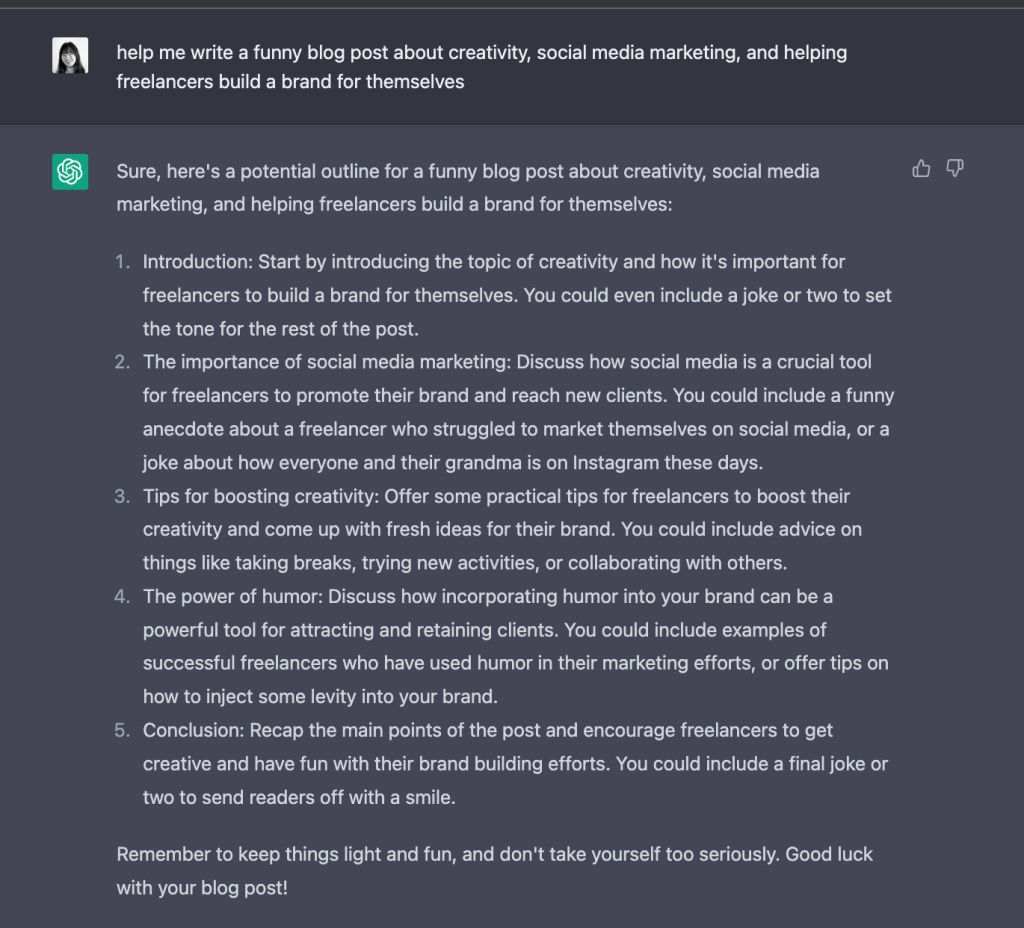Write,
Post,
Engage,
Repeat.
That’s all there is when it comes to keeping a blog.
The key is just to start.
I talk about art, design, and creativity
Write,
Post,
Engage,
Repeat.
That’s all there is when it comes to keeping a blog.
The key is just to start.
Right before writing this post, I didn’t know what I’d be writing about.
I didn’t think anything I had to say was worth saying.
I didn’t believe there was any value in my ideas.
It was easier to close my laptop and walk away from it all.
So I decided to write about it.
Here’s how I get over creative block.
For me, creative block stems from a lack of confidence in my own ideas.
The only way to get over that is to write more and build up my confidence by being comfortable hearing feedback about it.
Creativity cannot be assigned a grade.
Creativity is a given.
It can be strengthened like a muscle if you use it often.
So, use your creativity often.
Actually, it’s a way to exercise your headline writing.
Here’s what I do for content when I don’t have enough time to create something completely original:
I try my best to write something new every day, but sometimes I just need my bare minimum.
If you find yourself in a time crunch often, I hope this helps.
Everyone has the potential to be creative.
What sets creative people apart from the non-creative is the fact that creative people use their creative skills on a daily basis.
In other words, they practice it.
Intentionally.
Regularly.
Because it’s a part of their routine.
If you want to become a better writer, a better leader, a better business owner, then you’ve got to start practicing.
P.S. this took 15 seconds.

The law of diminishing returns is an economic concept that refers to the point at which the level of benefits gained from an activity starts to decrease after a certain level of investment.
In the context of the creative process, the law of diminishing returns suggests that there is a point at which adding more resources, such as time, effort, or money, to the creative process will not result in a proportionate increase in the quality or value of the final product.
For example, if a designer spends a certain amount of time on a project, they may be able to create a high-quality design that meets the client’s needs.
However, if they continue to work on the project for an extended period of time, they may reach a point where the additional effort does not result in a significantly better design.
In this case, the law of diminishing returns would be in effect, as the designer would not be receiving a proportionate increase in benefits for their additional effort.
Overall, the law of diminishing returns suggests that it is important to carefully consider the investment of resources in the creative process, as there is a point at which the benefits of additional effort will start to decrease.
Writing an idea a day has helped me dramatically sharpen my writing skills.
Here are 3 things that I learned from my daily writing habit
Have you been thinking about writing as a personal hobby or skill?
If so, you might want to sign up for a potential writing community I want to drop in the near future. It hasn’t happened yet, but I want to get a sense of how many people would be interested in joining such a thing if it comes.
Sign up for it here: https://mailchi.mp/25b1899732fe/writing-workshop
There are only so many hours in a day.
Whether you’re leading a meeting, taking a phone call, or working on a design project, there’s a point to be addressed.
Address your point by asking the 2 questions:
Get to the point as soon as you can, where appropriate.
I’m not talking about stocks or passive income streams.
I’m talking about working on yourself and making a commitment.
If you could make a promise to yourself that would make you proud in a year’s time, would you do it?
I’m not talking about making a sudden huge commitment today, right now.
I’m talking about small, tiny wins that snowball into something much bigger and impactful, overtime.
The idea is as follows.
I’m thinking of starting a writing community.
It won’t be free (but it might be $3 a day for x amount of days).
The details are still being rolled out, but I’d love to hear if anyone wants to join me for the ride.
If you’re anything like me, you’re a sucker for learning alongside great people.
That’s what The Habit Factory has always been about.
If you want to be a part of the process and hear about the writing workshop when it comes, I’d love for you to sign up for our newsletter here
I hope to see you there.